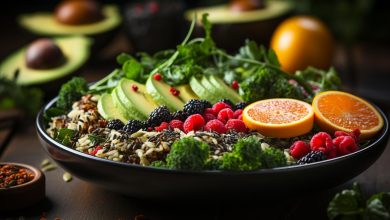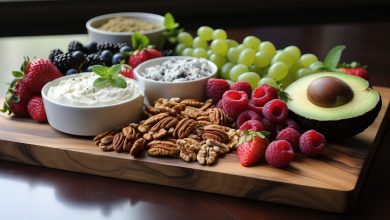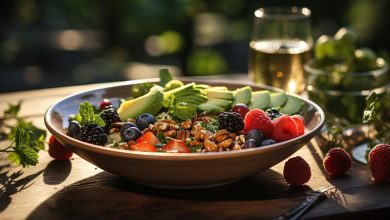The Benefits of a Plant-Based Diet for Runners

Imagine a world where you effortlessly glide through your runs, with boundless energy and speedy recovery. A plant-based diet can be the key to unlocking these benefits for runners like you.
By fueling your body with nutrient-rich fruits, vegetables, and whole grains, you’ll experience improved energy levels, faster recovery time, enhanced endurance, reduced inflammation, and optimal nutrient intake.
This article will explore the evidence-based research behind the advantages of a plant-based diet for runners. So lace up your shoes and prepare to discover how plants can power your performance.
Improved Energy Levels

You’ll notice a significant boost in your energy levels when you switch to a plant-based diet. Research has shown that adopting a plant-based diet can lead to increased stamina and improved performance for runners.
One reason for this is the high nutrient content found in plant-based foods. Fruits, vegetables, whole grains, and legumes are packed with vitamins, minerals, and antioxidants that support optimal health and energy production.
Plant-based foods are also rich in complex carbohydrates, which serve as the primary fuel source for endurance activities like running. These complex carbs provide a steady release of energy throughout your workout or race, preventing fatigue and helping you maintain a consistent pace.
Furthermore, plant-based diets have been associated with improved blood flow and reduced inflammation. This means that nutrients are efficiently delivered to your muscles, promoting faster recovery and reducing post-exercise soreness.
Numerous studies have demonstrated the benefits of a plant-based diet on athletic performance. For example, research published in the Journal of the International Society of Sports Nutrition found that runners who followed a plant-based diet experienced enhanced endurance compared to those following an omnivorous diet.
Faster Recovery Time

Eating more plant-based foods can help you recover faster after intense workouts. Incorporating a variety of fruits, vegetables, whole grains, and legumes into your diet provides numerous benefits for runners. Here are four ways that a plant-based diet can aid in your recovery:
1. Increased Muscle Strength: Plant-based foods are rich in essential nutrients like protein, which is crucial for repairing and building muscle tissue. Foods such as tofu, lentils, quinoa, and nuts are excellent sources of plant-based protein.
2. Improved Cardiovascular Health: Plant-based diets have been linked to reduced risk of heart disease and improved cardiovascular function. By consuming foods like berries, leafy greens, beans, and whole grains that are high in antioxidants and fiber, you promote heart health and enhance blood flow during exercise.
3. Reduced Inflammation: Plant-based diets tend to be anti-inflammatory due to their abundance of phytonutrients like flavonoids and carotenoids found in fruits and vegetables. This can help alleviate post-workout inflammation and soreness.
4. Enhanced Nutrient Absorption: Plant-based foods are typically easier to digest than animal products, allowing for better absorption of key nutrients needed for recovery.
By adopting a plant-based diet rich in these nutrient-dense foods, you can experience faster recovery times after intense workouts while also improving your overall health.
Transitioning from the topic of faster recovery time with a plant-based diet to enhanced endurance…
Enhanced Endurance
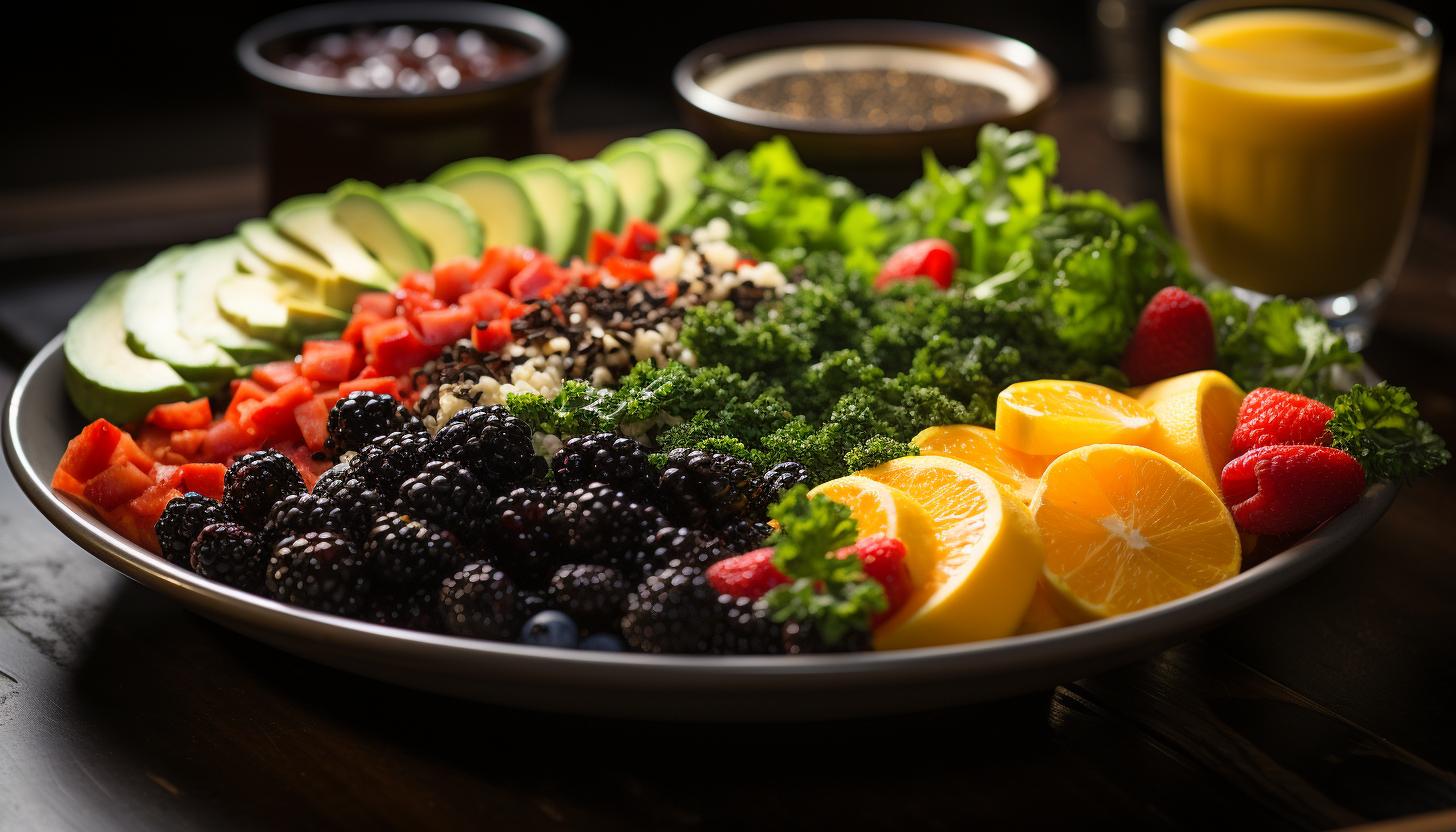
Incorporating more plant-based foods into your meals can lead to enhanced endurance during physical activities. Research has shown that a plant-based diet can significantly increase stamina and enhance performance in athletes, including runners. Plant foods are rich in complex carbohydrates, which provide a steady release of energy throughout the day, helping you sustain your energy levels during long runs or intense workouts.
One key component of a plant-based diet that promotes increased stamina is the high fiber content. Fiber helps regulate blood sugar levels and prevents spikes and crashes in energy. This means that you’ll have a more stable and consistent supply of fuel for your muscles, allowing you to go further and push harder.
Plant-based diets also tend to be lower in saturated fats compared to animal-based diets. Excessive consumption of saturated fats has been linked to decreased athletic performance and increased fatigue. By reducing your intake of saturated fats and focusing on whole plant foods like fruits, vegetables, legumes, nuts, and seeds, you can optimize your body’s ability to perform at its best.
Furthermore, plant-based diets are packed with essential vitamins, minerals, antioxidants, and phytochemicals that support overall health and aid in recovery from exercise-induced stress. These nutrients help reduce inflammation in the body while boosting the immune system – crucial factors for enhancing endurance during physical activities.
To summarize, incorporating more plant-based foods into your meals can provide numerous benefits for runners seeking increased stamina and enhanced performance. By fueling your body with nutrient-dense whole plants instead of relying solely on animal products or processed foods, you can take your running game to the next level.
Reduced Inflammation

Reduced inflammation can be achieved by consuming a plant-based diet rich in antioxidants and phytochemicals. Certain foods have been found to be particularly effective in combating inflammation in the body. Here are four anti-inflammatory foods that you should consider incorporating into your plant-based diet:
1. Berries: Blueberries, strawberries, and raspberries are all packed with antioxidants that help fight inflammation. They also contain high levels of vitamin C, which has been shown to reduce markers of inflammation in the body.
2. Leafy greens: Spinach, kale, and Swiss chard are excellent sources of vitamins A, C, and K as well as minerals like magnesium and potassium. These nutrients have been linked to reduced levels of inflammatory markers in studies.
3. Turmeric: This vibrant yellow spice contains a compound called curcumin, which has powerful anti-inflammatory properties. Including turmeric in your cooking or taking a curcumin supplement can help reduce inflammation in the body.
4. Legumes: Beans, lentils, and chickpeas are not only great sources of plant-based protein but also contain fiber and various anti-inflammatory compounds such as quercetin and kaempferol.
Optimal Nutrient Intake
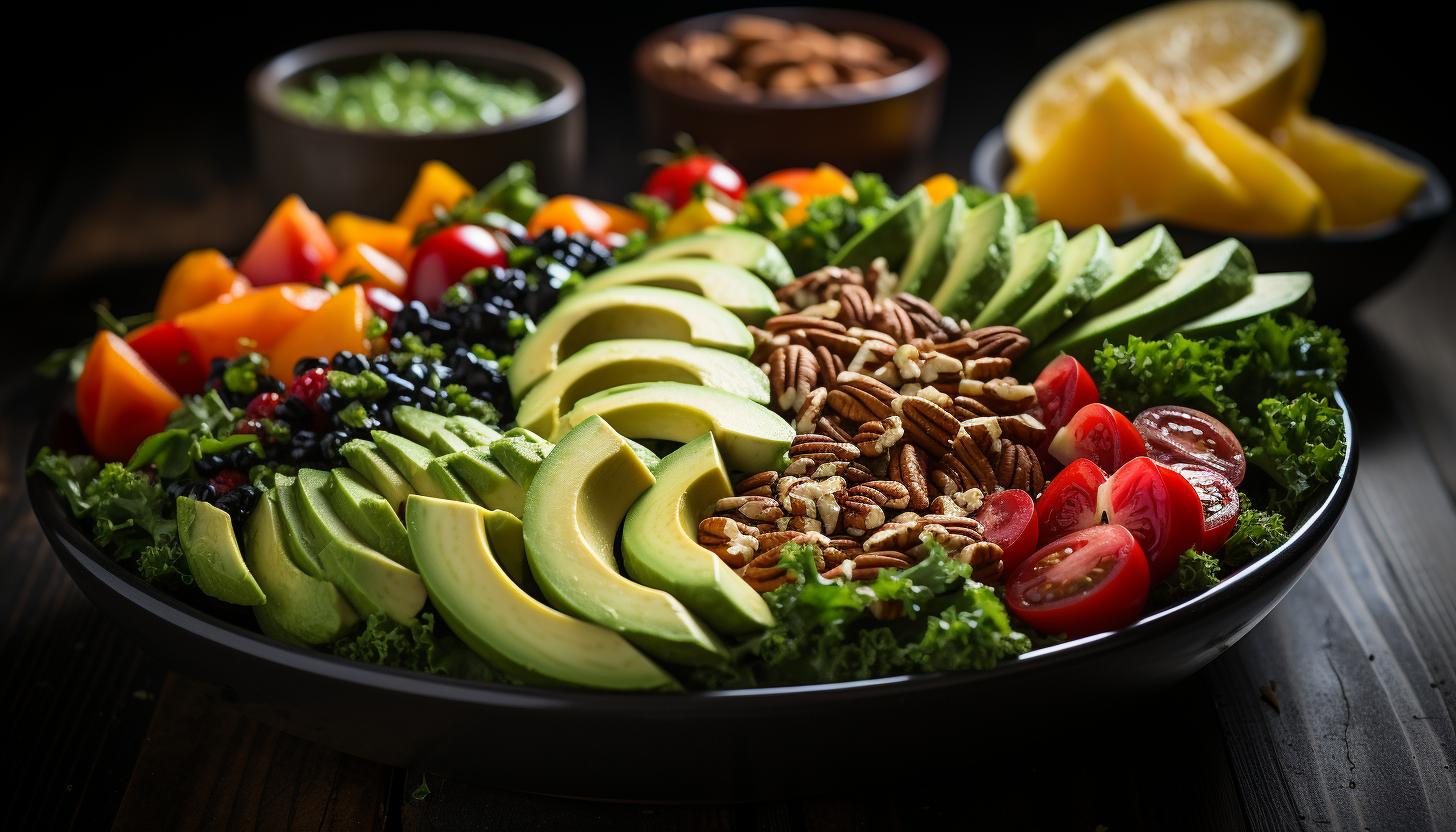
To ensure optimal nutrient intake, it’s important to focus on a variety of colorful fruits and vegetables in your diet. A balanced diet rich in these plant-based foods is key for runners looking to support their overall health and performance. Fruits and vegetables are packed with essential vitamins, minerals, antioxidants, and fiber that can help fuel your body and aid in recovery.
In addition to providing necessary nutrients, fruits and vegetables also play a crucial role in nutrient absorption. Research has shown that the high fiber content found in these foods can enhance the absorption of other nutrients from the meals you consume. Fiber acts as a prebiotic, promoting the growth of beneficial gut bacteria that aids in digestion and nutrient uptake.
Moreover, different colored fruits and vegetables offer unique sets of nutrients. For example, orange fruits like oranges and carrots are high in vitamin C and beta-carotene, while leafy greens like spinach and kale are excellent sources of iron and calcium.
Conclusion
In conclusion, adopting a plant-based diet can have numerous benefits for runners. By fueling your body with nutrient-rich foods from plants, you can experience improved energy levels, faster recovery times, enhanced endurance, and reduced inflammation.
Contrary to common belief, it is possible to obtain all the necessary nutrients from a plant-based diet when properly planned. So don’t let concerns about nutrient deficiencies hold you back from enjoying the advantages of this sustainable and health-promoting dietary choice.
Trust the research and give it a try!


